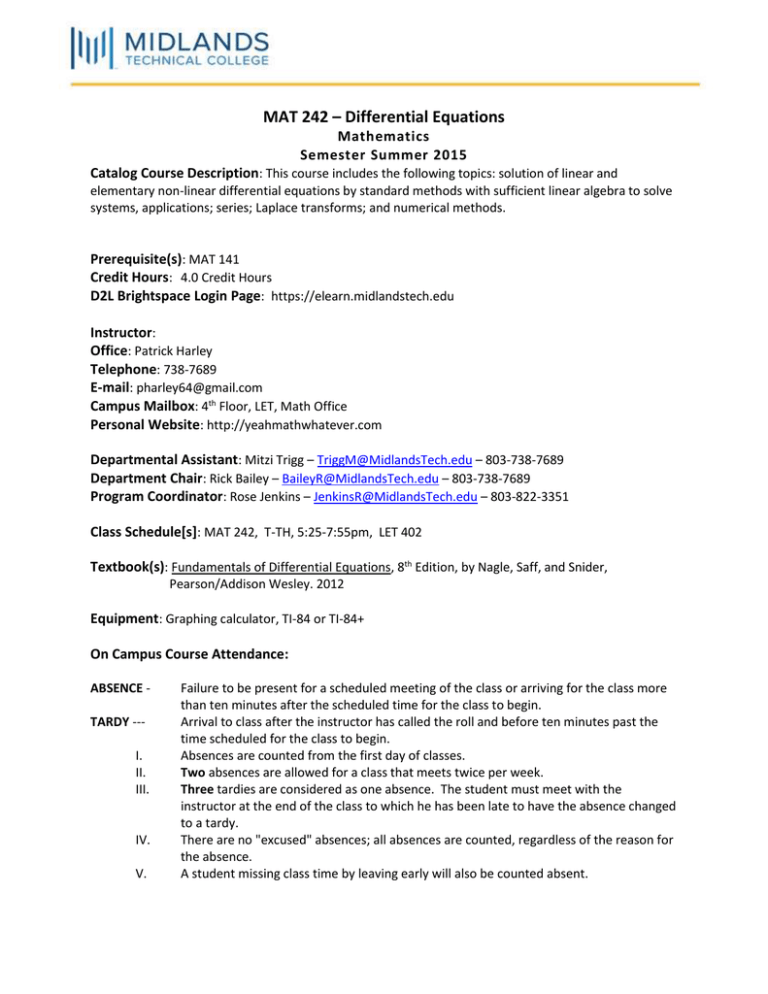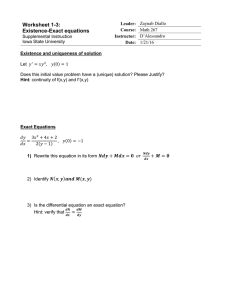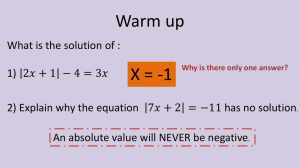
MAT 242 – Differential Equations
Mathematics
Semester Summer 2015
Catalog Course Description: This course includes the following topics: solution of linear and
elementary non-linear differential equations by standard methods with sufficient linear algebra to solve
systems, applications; series; Laplace transforms; and numerical methods.
Prerequisite(s): MAT 141
Credit Hours: 4.0 Credit Hours
D2L Brightspace Login Page: https://elearn.midlandstech.edu
Instructor:
Office: Patrick Harley
Telephone: 738-7689
E-mail: pharley64@gmail.com
Campus Mailbox: 4th Floor, LET, Math Office
Personal Website: http://yeahmathwhatever.com
Departmental Assistant: Mitzi Trigg – TriggM@MidlandsTech.edu – 803-738-7689
Department Chair: Rick Bailey – BaileyR@MidlandsTech.edu – 803-738-7689
Program Coordinator: Rose Jenkins – JenkinsR@MidlandsTech.edu – 803-822-3351
Class Schedule[s]: MAT 242, T-TH, 5:25-7:55pm, LET 402
Textbook(s): Fundamentals of Differential Equations, 8th Edition, by Nagle, Saff, and Snider,
Pearson/Addison Wesley. 2012
Equipment: Graphing calculator, TI-84 or TI-84+
On Campus Course Attendance:
ABSENCE TARDY --I.
II.
III.
IV.
V.
Failure to be present for a scheduled meeting of the class or arriving for the class more
than ten minutes after the scheduled time for the class to begin.
Arrival to class after the instructor has called the roll and before ten minutes past the
time scheduled for the class to begin.
Absences are counted from the first day of classes.
Two absences are allowed for a class that meets twice per week.
Three tardies are considered as one absence. The student must meet with the
instructor at the end of the class to which he has been late to have the absence changed
to a tardy.
There are no "excused" absences; all absences are counted, regardless of the reason for
the absence.
A student missing class time by leaving early will also be counted absent.
Withdrawal: Should the maximum allowable absences be exceeded prior to midterm, a "W" will be
submitted to the registrar to be recorded on the student's transcript. Should the maximum allowable
absences be exceeded after midterm, a "W" will be submitted to the registrar if the student was passing
the course at the time of withdrawal OR a "WF" will be submitted if the student was failing the course at
the time of withdrawal.
Course Grading:
The course grading will consist of 6 tests, and one HW grade.. In addition, there will be a
cumulative final exam. One test may be dropped,. Thus, there will be 7 grades, equally weighted, at the conclusion
of the course. The average of these grades will determine your grade following the scale below.
Grading Scale:
90-100
80-89
70-79
60-69
0
A
B
C
D
F
Classroom Rules/Other:
Superior Work
Good Work
Average Work
Below Average Work
Unsatisfactory Work
[The general routine of the class will move in three stages: (1) Instructor
reviews some homework, (2) instructor lectures on new material, (3) students work problems.
There will be no makeup tests given for this course, unless there is a written doctor's excuse for the absence on
the day of the test, and the instructor deems the illness to be serious enough to have warranted missing the test.
Death or illness in the family is always a terrible thing, but does not qualify under the rule established here.
In the event of class disruption by a student - the MTC code considers such behavior, on the part of a student,
an Honor Violation. According to college policy, the instructor is obligated to: (1) first warn the student that they
are committing a violation, (2) ask the student to leave (calling in Campus Security if necessary). I am required, by
contract, to remove all disruptive students from the class, and will follow this policy.
MTC policy forbids use of cell phones during class time, or disruption by a student who leaves class to make
phone calls. I am required by contract to enforce this policy. If a cell phone is visible during the lecture, the student
will be asked to leave class immediately.
Course Topic Outline/Course Calendar with Assignments
Current
Week
Topics Covered
Week 1
Introduction
Background
Solutions and Initial Value Problems
Direction Fields
The Approximation Method of Euler
Week 2
Week 4
Week 5
Week 6
Week 7
Week 8
1.1
1.2
1.3
1.4
First Order Differential Equations
Introduction: Motion of a Falling Body
Separable Equations
Linear Equations
Week 3
Section
Exact Equations
TEST 1
Mathematical Models and Numerical Methods Involving FirstOrder Equations
Mathematical Modeling
2.1
2.2
2.3
2.4
3.1
Compartmental Analysis
3.2
Heating and Cooling of Buildings
3.3
Newtonian Mechanics
3.4
Improved Euler’s Method
3.6
Higher Order Numerical Methods: Taylor and Runge-Kutta
Methods
TEST 2
Linear Second-Order Equations
Introduction: The Mass-Spring Oscillator
3.7
Homogenous Linear Equations: The General
Solution
Auxiliary Equations with Complex Roots
Nonhomogenous Equations; Method of Undetermined
Coefficients
The Superposition Principle and Undetermined Coefficients
Revisited
Variation of Parameters
TEST 3
Laplace Transforms
Introduction: A Mixing Problem
Definition of the Laplace Transform
4.2
Properties of the Laplace Transforms
Inverse Laplace Transforms
Solution of Initial Value Problems
Transforms of Discontinuous and Periodic Functions
TEST 4
4.1
4.3
4.4
4.5
4.6
7.1
7.2
7.3
7.4
7.5
7.6
Current
Week
Topics Covered
Series Solutions of Differential Equations
Introduction: The Taylor Polynomial Approximation
Power Series and Analytic Functions
Power Series Solutions to Linear Differential Equations
Week 9
Week 10
Method of Frobenius
TEST 5
Systems of First Order Linear Equations
Introduction
Review 1: Linear Algebraic Equations
Review 2: Matrices and Vectors
Linear Systems in Normal Form
Homogeneous Linear Systems with Constant Coefficients
Complex Eigenvalues
TEST6
Section
8.1
8.2
8.3
8.6
9.1
9.2
9.3
9.4
9.5
9.6
Note: Student Learning Outcome data will be collected on tests and/or other assessments during the
fall semester of even numbered years.
PLEASE NOTE: Should change become necessary, the instructor reserves the right to adjust the
requirements, pace, or scheduling of this course. Any change will be announced in class before it
becomes effective.




